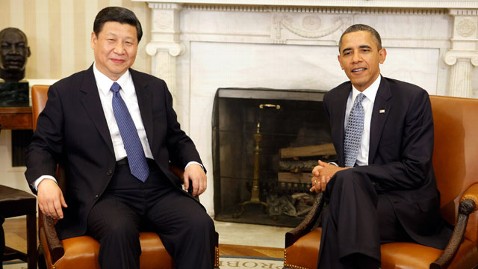President Obama to Press Chinese President on Cybersecurity, As NSA Surveillance Looms Large

Image credit: Chip Somodevilla/Getty Images
SAN JOSE, Calif. - News that the U.S. government has been secretly monitoring Americans' phone calls and internet activity is threatening to derail President Obama's efforts to press Chinese President Xi Jinping on cybersecurity when the two leaders sit down for two days of talks in California later today.
Obama is looking for indications his counterpart is ready to address high-tech attacks that China is reportedly launching to steal sensitive information from the U.S. government and private sector.
The recent disclosure of the Obama administration's own surveillance operations, however, now looms large over Obama's efforts.
While the Chinese have denied such spying, these meetings give Obama an opportunity to outline his case in person and to see if Xi is willing to tackle the reported hackings, which the White House believes threaten the U.S. economy and national security.
"We expect this to become a standing issue in the U.S.-China relationship, given the importance of cybersecurity to the global economy," a senior administration official told reporters on a conference call this week. "The message that the president will send is that there's an expectation that all of us are working together to protect the infrastructure of the global economy against cyber intrusion and that countries need to meet their responsibilities."
The two countries have already established a working group and agreed to hold regular discussions on the issue.
"Xi seems to be someone who is fast on his feet, who is open to engagement," the official said. "There is reason to hope that President Obama and President Xi can, beginning from a high starting point, have a substantive, candid and productive conversation."
The "getting to know you" meetings are also aimed at forging a personal connection between the two leaders as the superpowers chart a new relationship.
The somewhat casual setting, the luxury 200-acre "Sunnylands" estate in Palm Springs, Calif., once owned by Walter Annenberg, was chosen, in part, to lessen the pressure that comes along with high-profile meetings in Washington.
"A venue like Sunnylands allows for a more informal set of discussions than we've had with China to date in the sense that it's a less scripted, less formal, less rigid agenda but, rather, there is some space for the two leaders to interact and have more open-ended discussions about the issues that underlie the U.S.-China relationship," the official said.
While the setting may be informal, the meetings will be long and the subject matters serious.
In addition to cybersecurity, the leaders also likely will discuss economic cooperation between the world's two largest economies and the U.S. military's expanding role in the region, Obama's so-called "Asia pivot."
Human rights concerns, Syria, and North Korea are also on the agenda.